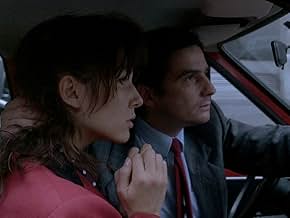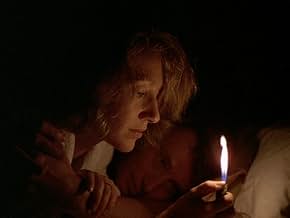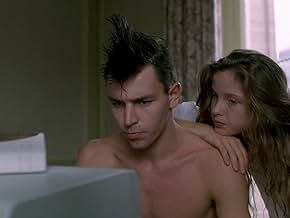Nell'intrigo, fatto a pezzi con il solito procedimento godardiano di decostruzione, galleggiano le componenti di un polar alla Chandler: un omicidio, un'indagine, un incontro di boxe, un tri... Leggi tuttoNell'intrigo, fatto a pezzi con il solito procedimento godardiano di decostruzione, galleggiano le componenti di un polar alla Chandler: un omicidio, un'indagine, un incontro di boxe, un triangolo amoroso, ricatti e sicari.Nell'intrigo, fatto a pezzi con il solito procedimento godardiano di decostruzione, galleggiano le componenti di un polar alla Chandler: un omicidio, un'indagine, un incontro di boxe, un triangolo amoroso, ricatti e sicari.
- Regia
- Sceneggiatura
- Star
- Premi
- 2 vittorie e 2 candidature totali
- Anne
- (as Ann Gisel)
- Punk Groupie
- (non citato nei titoli originali)
- Arthur von Furst
- (filmato d'archivio)
- (non citato nei titoli originali)
Recensioni in evidenza
CINEMA: If you're familiar with Godard's work then such devises should be recognisable, with the film using the clichés of detective cinema as window-dressing to express greater themes on the notions of relationships, as well as the role of cinema itself. We also have the self-referential aspect suggested by the opening shot, in which the scene that we are looking at and hear commentary on turns out to be something that has already happened, played back from the detective's surveillance video. We also have the notion of film as a background cacophony, with a number of scenes taking place in rooms where television sets conspire to distract us from the action at hand. DECONSTRUCTION #2: Three characters caught up in the clichés of a post-war crime picture, with a secondary plot about money and a farcical plan from both sides to double-cross the Mafia and each other. Does it matter? Yes and no. I disagree with the first reviewer who claims that this film is something of a throwaway in Godard's career; one that puts formal experimentation over content and theme. The plot is silly, but it's silly for a reason and goes back to Godard's earliest film, À bout de soufflé (1960), in which he played with the codes and conventions of American gangster cinema in a way that was progressive and entirely deconstructive.
ACTEURS: The film works as a result of the perfect casting. In fact, I'd say that the acting in this film is far better than any other film of Godard's that I have seen, and I've seen 25 of them. Léaud is obviously something of a regular in the films of Godard and his manic energy and uncomplicated air of boyish precociousness as this mysterious detective - trying to piece together a murder that may have happened or may be about to happen - is as bright as it was in films like Masculin, féminin (1966) and La Chinoise (1967). Likewise, Nathalie Baye, familiar from the director's earlier, more experimental feature Sauve qui peut (la vie) (1980) gives one of her best performances as a despondent housewife caught between two men as she tries to retrieve money to start a new life, but remains unsure of which man to draw allegiance to. The two men are boxing promoter and American cinema construct Johnny Hallyday, who breezes through the film chain-smoking and shooting pool as gangsters and cops threaten his plans from both sides, and Claude Brasseur, a pilot and the husband of Baye's character, once again, desperate to play both sides off against one another for the benefit of financial gain.
DECONSTRUCTION #3: Once again, we have Godard reducing the characters to meagre iconographic constructs that are placed in a knowingly cinematic environment that is continually challenged by the director's experimentations with content and form. Despite this however, the characters remain likable, intelligent and recognisable, with the convincing performances from the incredibly talented cast managing to compete with the cold, deconstructive formality that Godard strives for in his presentation. L'ARGENT: A film made for financial gain about financial gain, or at least, the promise of such. According to film critic Colin McCabe, Détective (1985) was produced as a favour to Alain Sarde so as to secure the funding for the director's dream project - the subsequent 'Je vous salue, Marie' (1985) - and this notion of desperation, and the wanton pursuit of money is almost self-referential in design. CRITIQUE: I honestly can't understand why so many admirers of Godard's work found this film disengaging. If you're already familiar with Godard's characteristic approach to cinema, then half of the work is already done. For me, the film was rich in character and ideas, and intelligently put together in a way that made the viewing of the film interesting and unique.
GODARD: Many would have you believe that Godard peaked in 1967, but this simply isn't the case. He's produced many fine films - Détective included - that require patience and perception on the part of the audience, and all released post-1980. This particular film might be considered a throwaway work by many Godard fans, but I would politely disagree. Like his best work, Détective is filled with ideas and a sharp commentary on the nature of cinema and the relationship between the director, the film, the characters and the audience. It does take work, but I feel that the work is worth it when we're dealing with something as interesting and progressive as this; with Godard throwing in all sorts of little jokes and observations (the detective as Prospero, aided by a character named Ariel, and with Léaud as the comic personification of Caliban, who eventually overcomes his master), whilst simultaneously turning in one of his most radical and well-rounded deconstructions on the nature of film and film viewing.
What is best in the film is the marvelous direction from Godard, who returns to a filmmaking that is more reminiscent of his 60's work than anything that came after this film, paying a homage to film noir as he did twenty years before to B-movies with Alphaville, although less successfully here. The camera doesn't move in this film and the shots are all very nicely done.
As for what the story regards, the script offers an engaging story that starts off a bit too slowly and an interesting character (a shame it's only one) who has to deal with some more compelling relationships as Nathalie Baye's character is caught between two men. The film has some of those Godardian undescriptible scenes to which you laugh or have feelings to without quite knowing how do they fit into a whole.
On the downhill, we have a film that actually gives no depth to their characters (except for Baye's) and whose satirical tones aren't as strong as you would expect. It has that pretentiousness that Godard usually manages to hide in his other movies and the whole film at the end feels as a mere direction exercise from his part, but if it was just a direction exercise, it is a great one.
Détective is a satirical film-noir with a fantastic direction, cinematography and editing, some witty scenes and a refreshing unresolved mystery.
Rating: 3/5.
It's hard to imagine how it is watching this in the theater. The film is so multi-layered that it's impossible to take in at one time.
I'm not sure what his stance is on the home video vs. theater debate. A movie so dense with quotes is almost destined to be better viewed at home. There are multiple scenes where if you pay attention to one thing, you wind up missing some other detail. Even after multiple viewings. I had to watch this more times than any of the other Godard film currently in print just to make sure I caught enough of the details.
As awesome technically as the film is, it somehow feels like a rehash of what he already did with First Name Carmen, Passion and Hail Mary. The fact that this was a commission may mean his heart wasn't quite in it. You could never accuse him of that with most of his other films.
Lo sapevi?
- QuizJean-Luc Godard dedicated the film to John Cassavetes, Edgar G. Ulmer and Clint Eastwood.
- Citazioni
Old Mafioso: Have you noticed that there are two kinds of men? Those who have a clean cock, and wash their hands before pissing so as not to dirty it, and those who have a dirty cock, which they touch while pissing and get their hands dirty, which they wash afterwards.
- ConnessioniEdited into Bande-annonce de 'Détective' (1985)
- Colonne sonoreSymphony in b minor, No.8, D.759, 'Unfinished', 1st movement: Allegro moderato
Composed by Franz Schubert (as Schubert)
I più visti
- How long is Detective?Powered by Alexa
Dettagli
Contribuisci a questa pagina































